A federal judge in Maryland has blocked former President Donald Trump's executive order attempting to end birthright citizenship. Judge Deborah Boardman ruled on Wednesday that the order violates the U.S. Constitution and long-standing Supreme Court precedent.
The lawsuit was filed by two immigrant rights groups, CASA and the Asylum Seeker Advocacy Project, along with five pregnant women. They argued that the executive order could deny their unborn children U.S. citizenship. Judge Boardman's ruling imposes a nationwide injunction, preventing the order from taking effect.

Court Rejects Trump's Interpretation of the 14th Amendment
Trump signed the order on his first day back in office, stating that children born in the U.S. should not receive automatic citizenship if their parents are not legal residents. However, Judge Boardman emphasized that the 14th Amendment explicitly grants citizenship to all individuals born on U.S. soil.
"No court has ever endorsed this interpretation," Boardman said. "This court will not be the first." She added that the order contradicts over 125 years of Supreme Court rulings and the nation's 250-year history of birthright citizenship.
Opponents of the order, including 22 states and several advocacy groups, argue that denying citizenship at birth would have severe consequences. "Birthright citizenship is a foundation of our democracy," the plaintiffs stated in court filings.
Legal Challenges and Political Reactions
The Maryland case is one of several lawsuits challenging Trump's executive order. A federal judge in Seattle had already issued a temporary hold on the policy earlier this year. Judge John Coughenour, who blocked the order in January, called it "blatantly unconstitutional."
Eighteen Republican attorneys general have vowed to support Trump's order, arguing that the 14th Amendment has been misinterpreted. They claim the amendment was not meant to grant citizenship to children of undocumented immigrants. The case is expected to continue through multiple courts, with a final decision likely to reach the Supreme Court.
Families Fear Uncertain Future
One of the plaintiffs, a pregnant doctor from Venezuela, shared her fears about the impact of the order. "I'm 12 weeks pregnant, and I should be focused on my child's health," she said. "Instead, my husband and I are anxious and afraid that our baby may not be recognized as a U.S. citizen."
The legal team representing the plaintiffs argued that the order creates unnecessary fear and confusion. "This is a drastic departure from over a century of established law," attorney Joseph Mead said. "It affects people who have built their lives in the U.S. and contributes to real-world harm."
What's Next?
For now, Trump's executive order remains blocked. However, legal battles over birthright citizenship are far from over. With multiple hearings scheduled across different states, the final outcome remains uncertain.
"This law and tradition will remain the status quo pending the resolution of this case," Judge Boardman said. "Every child born on U.S. soil is a U.S. citizen—that is the law."









